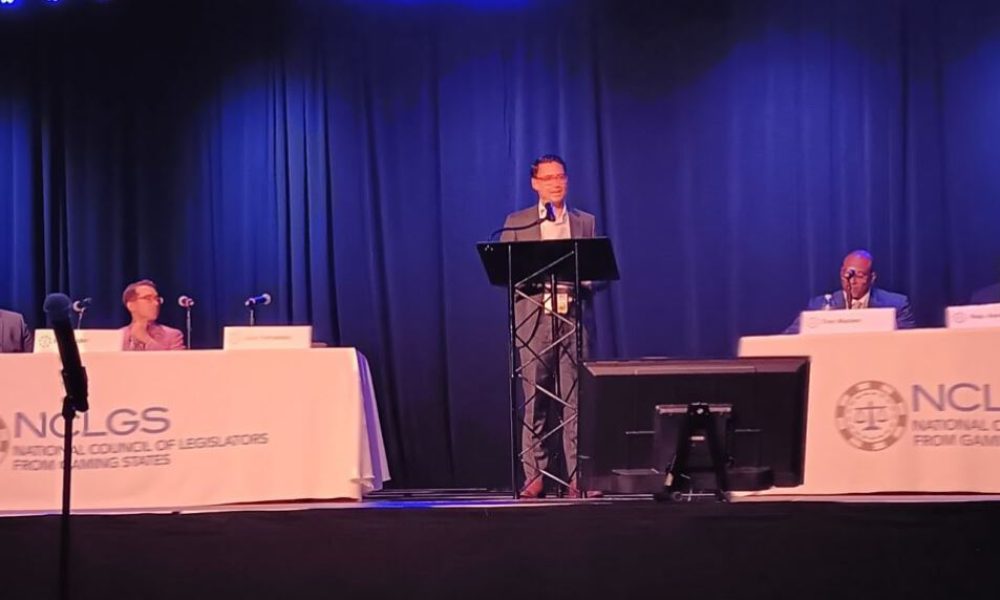The panel title was “Just the Facts, Ma’am,” the topic whether gaming companies are living up to their tax obligations.
If any attendees at the National Council of Legislators from Gambling States panel Thursday at Rivers Casino in Pittsburgh, Pennsylvania, expected the speakers to say they owe more taxes, they were at the wrong session.
Panelists Brandt Iden, vice president of government affairs for Fanatics, FanDuel Senior Director of State Government Affairs Cesar Hernandez, and Boyd Gaming Vice President of Government Affairs Ryan Soulz came prepared with slide decks and an avalanche of statistics to prove that they’re not only paying their fair share of taxes, but more than similar corporations.
“At the end of the year after we pay our fair shar in terms of taxable income, we have to pay the corporate tax rate,” Hernandez said, referring to New York’s 51% taxation rate on sports betting companies. “It’s puzzling to me that no other companies are treated this way. No other companies have that type of tax exposure. Goldman Sachs pays seven times less in terms of taxes in New York.
“And at the end of the day, we have the same cost structure.”
When New York State Assembly Committee Coordinator, Racing and Wagering Troy Mackey was asked about the 51% rate, he noted that FanDuel has been a great partner, but the rate is set in stone.
“It’s one of those things. We can’t go back, unfortunately, and reduce the tax rate,” Mackey said. “You couldn’t justify taking away money from education to give to a corporation. That’s the argument we’re up against. We tried, again, to put in legislation that would reduce the tax rate. We were hoping to balance it out in reference to reducing the rate. We want entities involved, but folks at a higher pay rate than myself are against it.”
“The moral of this is that governments don’t reduce tax rates,” Iden said. “Wow. Surprising that they only go in one direction.” Iden continued, “New York isn’t a model that anyone is looking to replicate in terms of tax rates. It’s not something from an operator’s perspective that anyone wants. It works for New York, because it’s New York.”
Iden highlighted Michigan as a state that has a better taxation model for operators. Noting that a licensing fee is $100,000 for five years, he said that structure works for the state and is manageable for operators.
“Everybody wins in this scenario,” said Iden, who posted a slide that stated the economic impact of regulated gambling in Michigan has been $11.7 billion. “In terms of the tax breakdown, 65% of the internet gaming fund goes to education, firefighter cancer prevention, and RG (responsible gaming), 30% to the city of Detroit, 5% to the equine fund. Look at these numbers. They do wonderful things. Yours truly, I don’t have kids, but money goes toward your kids, which is a great fun fact.”
Boyd’s Soulz also came prepared with facts, posting a slide showing that the annual gross gaming revenue from gambling is $107.5 billion, including commercial and tribal gaming. Taxes paid per year total $14.6 billion.
“I appreciate the fact that we’re going to talk about tax revenue, because it’s important,” Soulz said. “Especially as policy makers, you have decide what the fiscal policy of your state is.”
But Soulz emphasized that policy makers should also be cognizant of the economic impact operators have in jurisdictions.
“Think about this facility here,” Soulz said, referring to Rivers Casino. “Jobs here are helping us run this great event in this event space. People are operating the table games at this property and other properties throughout the country. Some hotel workers are the people you don’t see on the front lines, finance, audit, compliance, management, and so on. The impact is created, because there’s a casino, there are casinos, and they’re legalized and regulated.”




